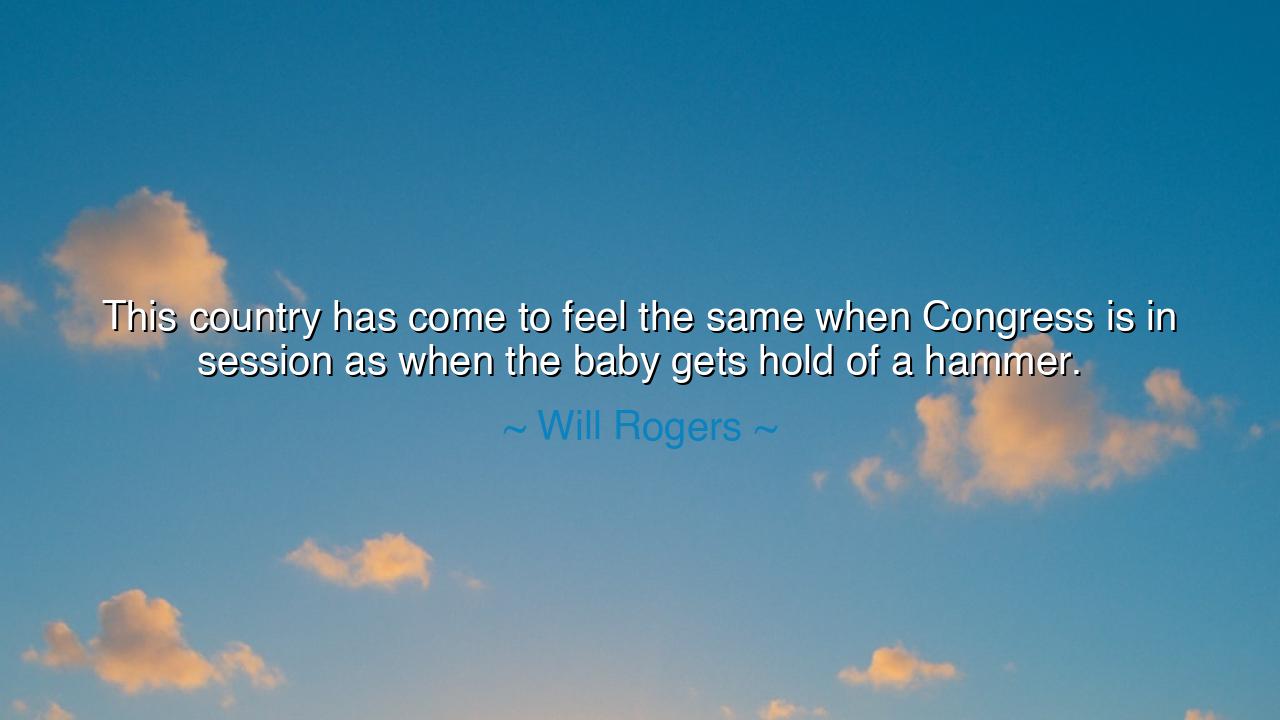
This country has come to feel the same when Congress is in
This country has come to feel the same when Congress is in session as when the baby gets hold of a hammer.






"This country has come to feel the same when Congress is in session as when the baby gets hold of a hammer." — Will Rogers
Hear these words, O seekers of wisdom, and let their humor not conceal their truth. Will Rogers, the cowboy philosopher and humorist of the American plains, spoke with the wit of a jester but the heart of a sage. When he declared, “This country has come to feel the same when Congress is in session as when the baby gets hold of a hammer,” he gave laughter to a sorrow that has haunted nations through the ages — the fear that those entrusted with power may wield it clumsily, carelessly, and to the harm of the very people they claim to serve. Beneath his jest lies a timeless warning: that governance without wisdom is more dangerous than chaos, and that the might of law, when misused, strikes like a hammer in unsteady hands.
The meaning of this quote is layered in satire and sadness. Rogers compares Congress, the symbol of national authority and deliberation, to a baby with a hammer — innocent, perhaps well-intentioned, but ignorant of the damage it can cause. He suggests that when lawmakers gather, the people tremble not from respect, but from apprehension, fearing what new laws, taxes, or follies might emerge from their labor. The hammer, in this image, stands for power — the power to build or to break. A baby, not knowing its strength, will smash the very thing it hopes to shape. Likewise, a government that acts without foresight or humility can destroy the harmony it was meant to preserve.
The origin of Rogers’ wisdom lies in the turbulent early years of the twentieth century. America had grown powerful — its industries vast, its people ambitious, its politics entangled in greed and partisanship. Rogers, traveling the land and speaking to both farmer and president alike, saw how the gap between the people and their representatives had widened. Congress, instead of serving as the guardian of the public good, often appeared as a stage for self-interest and vanity. Scandals erupted, waste multiplied, and debates that should have sought truth descended into spectacle. Out of this disillusionment came Rogers’ gentle but piercing humor. He made the people laugh, but he also made them think — for in his jest lay the uncomfortable recognition that power, when wielded without understanding, becomes a danger to its wielder and to all around him.
Consider the lessons of history, and you will see Rogers’ truth repeated across the ages. In ancient Rome, the Senate — once the pillar of wisdom — became a theater of corruption, more concerned with glory than governance. In their arrogance, the senators believed they could rule without restraint. They passed laws that enriched the few and burdened the many, until the people’s trust shattered, and Rome’s republic crumbled into tyranny. The baby’s hammer, once a tool of creation, became the weapon of its own undoing. Rogers’ America was not Rome, but he saw the same seeds of folly — and warned that laughter is often the first sigh of despair when the wise refuse to listen.
And yet, Rogers’ humor was not born of bitterness. It was born of love for a country he wished to awaken. His words remind us that the true purpose of government is not to display power, but to practice restraint; not to legislate endlessly, but to serve justly. A congress, a parliament, a senate — these are not playgrounds of pride, but sacred assemblies where the people’s trust is forged into law. When such bodies forget their purpose, when they wield authority as a child does a toy, the people lose faith, and democracy trembles. Rogers, in his simplicity, was teaching a principle as old as civilization itself: that those who govern must first learn to govern themselves.
But let us not place all blame upon the rulers, for the people, too, hold a hammer in their hands — the hammer of consent and voice. When they are careless, when they fail to vote, to question, to demand integrity, they too swing blindly. The baby with the hammer may sit in Congress, but the hand that placed it there belongs to the people. Thus, Rogers’ warning is not only for the governors but for the governed: that power, in any form, demands maturity. The citizen must be as vigilant in his watchfulness as the ruler must be humble in his duty.
So take this lesson, O heirs of freedom: laughter is often the voice of truth. When Rogers spoke of babies and hammers, he was not mocking government — he was reminding us of its fragility. Power must be guided by wisdom, and wisdom must be guided by conscience. When you hold authority, be it over a household, a business, or a nation, wield it with steady hands and thoughtful heart. And when you see folly among those who govern, do not despair — but awaken, speak, and act. For democracy, like a hammer, can build or destroy depending on who holds it. And if, in your time, you find yourself tempted to wield it carelessly, remember the laughter of Will Rogers — and let it be the voice that steadies your hand before the blow falls.






AAdministratorAdministrator
Welcome, honored guests. Please leave a comment, we will respond soon